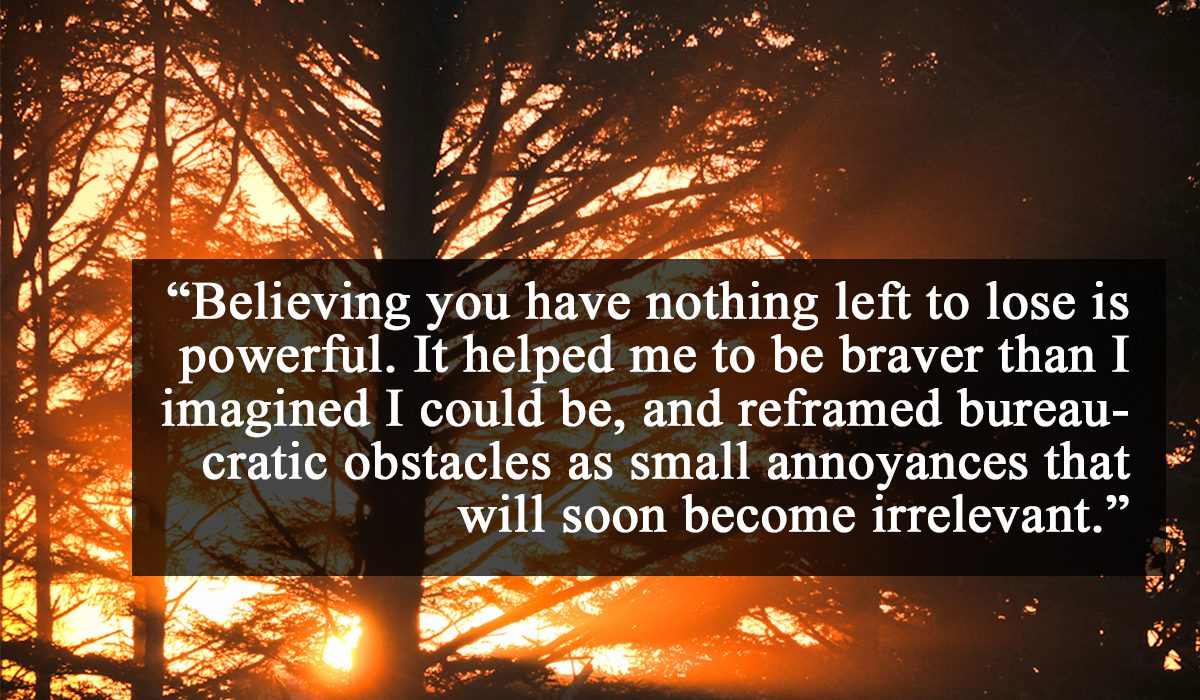
Catie Gould is Co-Chair of Bike Loud PDX and a regular BikePortland contributor. She last wrote about Portland’s housing policy.
__
Every Thursday for the last few months, I’ve been attending a small meeting in a back room of the Central Lutheran Church. Sipping tea around a table decorated with fall leaves, I took turns sharing with strangers how I feel about the climate crisis. The ten week program was put together by the Good Grief Network, which is sprouting chapters all over the world.
The support group couldn’t have come at a better time for me. In October I took a trip to Washington DC to visit my brother. At the Museum of Natural History, I was struck by a small sign. It read that the atmosphere was changing faster now than any other mass extinction event in history. I stood there for several minutes, looking at the sign then back at all the other people in the exhibit hall walking past unaware. The science of climate change was not new to me, but this little sign rocked me, and sent me into a cycle of despair. My grief manifested as a shadowy doom that followed me around. It tapped me repeatedly on the shoulder and whispered ‘“mass extinction” in my ear. For nearly a month every transportation meeting I attended left me in tears, often not waiting until I was back home. No one was acting with the urgency that was needed.
For others who might be struggling, I wanted to share some of what I learned over the last few months.
Make space for feeling
So often, we grieve alone. We read horrifying news stories on our phones throughout the day, and look back up to see the world moving on, seemingly normal. The climate crisis is hard to talk about. Despite tweeting about it constantly I still have a hard time bringing it up with my parents or at work. I signed up for the support group to create this space for myself, but pretty quickly I showed up for everyone else in the group. I wanted to hold space for them to talk about the things too hard to say normally.
Advertisement
Having this regular weekly appointment forced me to take time for myself in a way that I hadn’t prioritized before. I declined meetings and events without thinking twice. It forced me to check in about how I was feeling each week. Was I feeling resentful, angry, or nervous? The commonality in our struggles gave more validity to my own feelings, and I got more serious about caring for myself. I cooked, made time to relax, and listened to my body. I started getting regular massages to help with the stress, something that always seemed too extravagant before. Instead of feeling stalked by doom I tried to care for it like an old friend.
Optimism is not required
“It was incredibly refreshing to exist in our worst case scenarios and darkest fears together.”
People talk about hope a lot in climate conversations. I love this quote from Rebecca Solonit, “Hope is not a lottery ticket you can sit on the sofa and clutch, feeling lucky. It is an axe you break down doors with in an emergency.” The truth is I am not hopeful at all that a better future is coming. I work harder because of it – to build my own hope. But if the future of the planet is dependent on a bunch of volunteers that is a hard row to hoe. It upsets other people to hear me say that. Even in activism circles I have been told before that I am a downer, or that talking about climate change with me is depressing. Comments like that make it hard to know when it’s ok to bring it up or how, and discourages people from talking about the crisis at all.
In this group, we weren’t trying to put on a good face and reassure each other things will be okay. None of us believed it would be okay. It was incredibly refreshing to exist in our worst case scenarios and darkest fears together. I left feeling a much stronger sense of how common these thoughts are and the realization that most people are just hoping for some sort of opening to talk about it. The hours spent discussing these really emotional issues made me more comfortable talking about the climate crisis like any other topic, a practice that I want to continue to grow.
Advertisement
Find new stories
“Believing you have nothing left to lose is powerful. It helped me to be braver than I imagined I could be.”
Moving from grief to action is a story that is repeated often in the media but I had considered myself an activist for years, and my close up view of how government works only made me feel more doomed. So this winter I tried to find more stories that I could relate to. I found the Mother of Invention podcast, read everything ever written by Mary Annaise Heglar. During the course of the support group she launched a podcast, Hot Take, about climate storytelling.
I was inspired by the ways the rest of the group were writing new stories. One of the attendees of my group was helping build a climate justice curriculum for Portland schools. Another regularly attended environmental rallies in Salem. I started convening a weekly meeting for Bike Loud PDX to review the 2030 Bike Plan and over the past few months it’s starting to feel like we can actually do something impactful for the city.
My extinction gloom turned upside down. Other people noticed it too. Believing you have nothing left to lose is powerful. It helped me to be braver than I imagined I could be, and reframed bureaucratic obstacles as small annoyances that will soon become irrelevant. I know that I will go through this cycle of despair again. My life will hopefully be long, and it’s exceedingly likely things will get worse before they get better. Coming together to talk about it seems like a small act, but we could all learn how to support each other better to face the challenges ahead. For better or worse, we are all on this rock together.
How are you all coping with climate grief? I’d love to hear some of your stories in the comments.
— Catie Gould, @Citizen_Cate on Twitter.
— Get our headlines delivered to your inbox.
— Support this independent community media outlet with a one-time contribution or monthly subscription.



